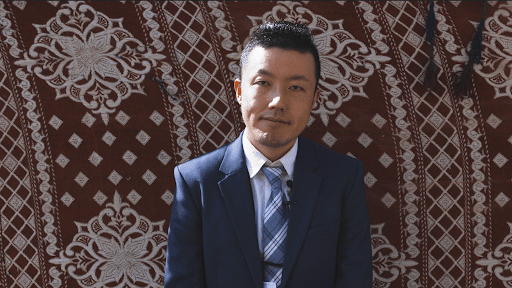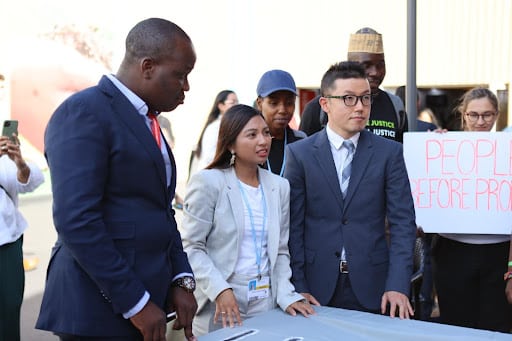My name is Masayoshi Iyoda, and I coordinate communications and advocacy at 350.org Japan. This year is the first time I’m part of 350.org’s delegation at the UN climate summit – but in total, COP27 is my fifteenth climate conference.
After so many years, you would think I might know what to expect, but each time is different – and in some ways, this meeting in Egypt is special. After years of negotiations about who will pay the climate bill and how, this year is about making promises and pledges into concrete plans. Climate finance for a just transition towards 100% renewables are what I’m focused on.

Masayoshi Iyoda at COP27
My day today was exceptionally busy! I was up at 6:00 am to prepare for my events and meetings. At 7:30, I joined the rest of the 350.org crew for breakfast and our daily briefing, and then I headed into the COP27 conference center with a few of my colleagues.
After joining a protest against Japan’s public finance for fossil fuels at 9:30am, I went to a transition finance event at the Japan Pavilion, attended by representatives of the Japanese delegation to COP27, and Japanese banks and business.
There, I saw a group of young African activists who joined the event to ask questions about the East African Crude Oil Pipeline, or EACOP, led by Total. Thanks to the intervention of the youth activists, Japanese bankers from MUFG had to answer some “uncomfortable” – but spot on – questions about their refusal to commit to not funding EACOP.
Two of three Japanese megabanks have not ruled out funding this destructive fossil fuel project yet. Sumitomo Mitsui Banking Corp (SMBC), a financial advisor to Total, and MUFG Bank, still provide support to the fossil fuel giant behind EACOP.
After the event, I met up with some civil society partners from Japan to talk about our plans and priorities. I grabbed a snack, and worked on my laptop for a while – standing up, as I couldn’t get a free table. I was really glad I had a big breakfast, because there wasn’t any time for a proper lunch!

Masayoshi of 350 Japan and other 350.org delegates at a civil society action at COP27.
Later, I went to the daily coordination meeting of the climate NGO network, where some international colleagues nominated Japan to receive the daily “Fossil of the Day” – an award for doing exceptionally badly in the negotiations. After a quick discussion, Japan won – and rightly (shamefully) so!
Japan is the world’s largest provider of public finance for fossil fuels, spending over $10 billion per year on new gas, oil and coal projects from 2019 to 2021. This “victory” for Japan made me busy preparing for the evening ceremony of the Fossil of the Day – drafting texts, fact checking, coordinating with international colleagues. Every action to pressure them to stop funding fossil fuels, and invest into a just transition, is worth doing!
Then I spoke to Japanese journalists. One of my main roles here at COP27 is to support them in understanding the key points of the complex negotiations, as well as the dynamics taking place outside of the official meeting rooms. For example, today I spoke with the media about the results of the US midterm elections and their implications here in Sharm, and about the climate finance gap that rich countries still needed to fill.
This is a really important role as part of the comms team that I’m happy to play – this way I support journalists in informing people in Japan about the climate conference, and what Japan should and shouldn’t do. Public opinion is what influences politicians, too.
Finally, after the Fossil of the Day ceremony at 6:00 PM, and a chat with some youth activists, I sat down at the COP27 computer center to answer emails and messages from journalists. The internet at the venue is always very slow, so it took me a long time before I finally got on the shuttle bus back to the hotel. I was so tired that I missed my stop, and had to walk back for almost half an hour…
It was a crazy long day, but after some rest and food, I felt really good about it. All day I worked towards my key goals – to make Japan and other rich developed nations pay for loss & damage and energy transition in Africa and other developing parts of the world. Japan’s megabanks and other financial institutions are still heavily funding dirty coal, oil and gas, and have a huge role to play in supporting a renewable energy revolution.
The people I meet and collaborate with here at COP27 are all working towards the same goals: keep fossil fuels in the ground, and keep global heating under 1.5C with climate justice. It’s worth getting up early and missing out on sleep to be part of this fight.
Thanks for reading along!
Masayoshi for 350.org Japan